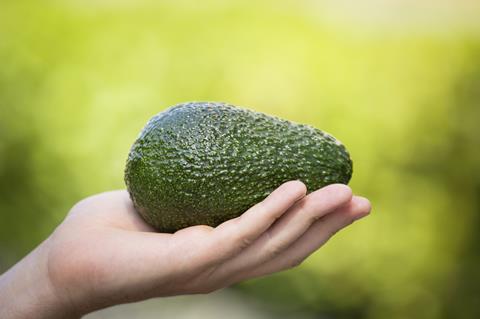To mark World Avocado Day, the organisation highlights avocados as a nutritional powerhouse and an environmentally conscious option

At a time when consumers are increasingly looking for foods that are both healthy and environmentally responsible, the World Avocado Organisation (WAO) is marking World Avocado Day on 31 July by unveiling new insights into how avocados perform when both nutrition and sustainability are considered together.
It notes that when evaluating how much water is required to obtain essential nutrients from different foods, avocados consistently stand out for their efficiency. “From fibre and potassium to healthy fats and magnesium, the comparisons offer a fresh perspective on how this fruit measures up against everyday staples,” WAO said.
“The message is simple but powerful: when we look beyond isolated headlines and compare nutrient content alongside water use per kilo, avocados emerge as a well-balanced, responsible option. It provides valuable context on how avocados fit into a modern, conscious diet and why their reputation as a superfood remains as relevant as ever.”
WAO chairman Zac Bard pointed out that with similar water usage compared to other fruit crops, minimal pesticide exposure and environmentally friendly farming practices, avocados provide a sustainable and nutritious choice for consumers.
“Through the use of advanced farming technologies, ethical practices, and a commitment to reducing environmental impact, the avocado industry is paving the way for a more sustainable future,” he noted.
“Compared to many commonly criticised foods such as beef, coffee, and chocolate, avocados emerge as a smarter, eco-conscious option for consumers looking to make healthier choices for both their well-being and the planet.”
According to the WAO, one kilo avocados offers one of the best potassium-to-water ratios among commonly consumed foods – with 4,500mg of potassium per just 800 litres of water (By comparison: bananas provide 3,300mg per 790 litres, and apples only 1,000mg per 822 litres). “Potassium is essential for maintaining steady energy levels, supporting muscle and nerve function, and helping to prevent blood sugar spikes, making avocados a powerful ally for sustained vitality,” WAO said.
A kilo of avocado also provides 45g of fibre using 800 litres of water – while apples and grapes offer just 12g each for similar water use (822 litres and 870 litres). Fibre is key for digestive health, helps regulate blood sugar, and promotes long-lasting satiety.
Moreover, one kilo of avocados provide 250mg of magnesium with 800 litres of water – outperforming other everyday foods like apples (40mg/822 litres) and tomatoes (80mg/214 litres), or even beef (220mg/15,415 litres). Magnesium plays a key role in energy production, supports healthy muscle function, and helps the body manage stress more effectively, making it essential for staying balanced, both physically and mentally.
“And did you know avocados deliver 1,900 kcal of energy per kilo with only 800 litres of water – making them more water-efficient than high-energy foods like chocolate (5,100 kcal per 17,196 litres) or nuts (5,810 kcal per 9,063 litres). This makes them an excellent choice for sustained vitality throughout the day, promoting balanced energy levels and helping to prevent overeating,” WAO said.
When it comes to saturates, avocados contain 41g of saturated fat per 800 litres of water – less than beef (56g/15,415 litres), while still contributing to satiety and nutrient absorption. In moderation, these plant-based saturated fats support the absorption of vitamins A, D, E and K, and play a role in hormone production.
WAO also points out that a kilo of avocados contains just 19g of carbohydrates, making them a low-carb, nutrient-dense option, especially compared to 265g in rice (1,673 litres) or 203g in bananas (790 litres)? This makes them a great choice for stable energy levels and blood sugar regulation.
“Finally, did you know that one kilo of avocados has only 5g of natural sugars per 800 litres –dramatically lower than fruits like bananas (181g/790 litres) or grapes (152g/608 litres), helping to maintain a lower glycaemic load,” WAO continued.
“Unlike most fruits, avocados are naturally low in sugar and rich in healthy fats, fibre and essential nutrients. In fact, they are one of the very few fruits not driven by sugar content, making them a powerful choice for sustained energy, blood sugar balance and long-lasting satiety. Gram for gram, avocados offer far more in nutritional value than most fruits, which is a key reason they’ve earned their ‘superfood’ status.”
The bigger picture: Sustainability through the avocado lens
According to WAO, avocados stand out as a smart and sustainable choice when viewed through a broader environmental lens. “With a low carbon footprint of just 2.4kg CO₂ per kilo, sea-based transport that drastically reduces emissions, and trees that naturally absorb CO₂ and protect soil, avocados offer clear climate advantages over foods like beef, coffee, and chocolate,” the organisation said.
“Their global water footprint – on average 800 litres per kilo – is also efficient, especially as producers adopt precision farming and agroforestry to reduce water use by up to 50%. Combined with responsible farming practices and minimal pesticide exposure, avocados continue to prove that sustainability and nutrition can go hand in hand.”



